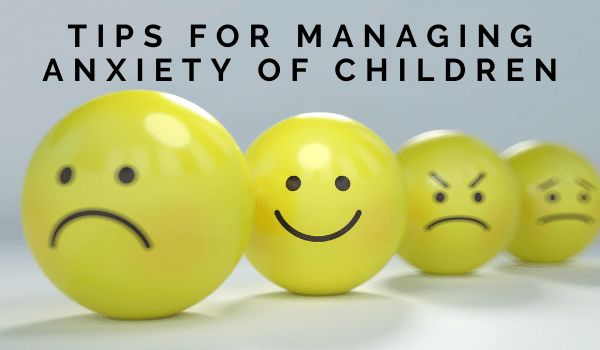Anxiety is a common and natural emotion we feel in response to stress. We all feel anxious from time to time. But when anxiety disrupts our everyday lives, it becomes a cause for concern. Children with special needs may be prone to anxiety more so than their neurotypical peers. Managing anxiety is an important skill that enables children to take control of their environment and gives them a sense of self-worth.
Anxiety issues that exist for a prolonged period of time cannot be dismissed as a ‘phase’ a child is going through or looked upon as something that will go away on its own. Anxiety can be debilitating and may fill children with guilt, shame, and a sense of inadequacy. Since we often tend to discuss mental health issues in hushed tones, those with anxiety do not get the support they need. Parents, caregivers, and teachers can support children by showing empathy and be willing to make accommodations for them whenever possible. Here are five tips for managing anxiety that can helpful for children with special needs:
Understanding How it Manifests


There are several signs of anxiety and it can even go undetected in certain children. Some of the common symptoms children can exhibit include:
- Trouble sleeping
- Poor focus
- Meltdowns
- Emotional outbursts
- Withdrawing or avoiding social interactions
- Stimming
- Restlessness
- Somatic symptoms such as headaches
- Stomachaches
- Crying/ screaming
Some symptoms of anxiety can often be misconstrued as a lack of discipline or non-compliance. It’s important to encourage open conversation with the child about mental health. We need to teach them how to identify when they get anxious so that they can seek help if needed. Drawing attention to their sweaty palms, accelerated heartbeat, icky feeling in their stomach, or how their hands flap can help them in recognizing how anxiety affects their body,
Identifying Triggers
Children with autism can get anxious if there are changes in routines. On the other hand, kids with dyslexia can feel anxious about a reading activity. Identifying the underlying cause for anxiety can help children manage it better. It must be noted that in some cases anxiety may occur due to a condition that requires medical attention and can be managed only under the supervision of a trained expert.
Here are some of the common causes of anxiety in children with special needs:
- Unexpected changes in routine – School closing due to rains
- Social situations – holiday parties, weddings, etc
- Sensory Issues – Lack of stimulation or overstimulation
- Worrying about an activity, event, or object – Upcoming test, performance, a broken pencil, missing book, visiting doctor, etc
- Changes in environment – visitors at home, change of school, moving to a different city, etc
- Sensing anxiety of those around
- Inability to complete a task as planned
Sound Mind in a Sound Body
A regular dose of exercise and following a balanced diet can do wonders for our physical health. Being active and eating healthy also keeps us in good spirits, thus relieving stress. Fit exercise into the child’s schedule and make sure they are engaged in some form of physical activity every day. Use children’s interests to encourage regular exercise. For example, children who love dancing, swimming, or biking can benefit from those activities while others can choose a sport they like or play games such as cricket, soccer, or basketball to stay fit.
Expressing Emotions


What happens when we feel different emotions and have no way of expressing them? Repressed emotions can build anxiety resulting in challenging behaviours. Provide a safe space for children to express their emotions such as anger, irritability, and sadness. Make sure that children understand that their feelings are valid and it’s okay to express them. By giving them a space where they can let their feelings be known without inhibitions, we enable them to not be overwhelmed or intimidated by big emotions.
Coping Toolbox
Every child should have access to a toolbox with several calming strategies that work for them. You can use social stories for emotional self-regulation or sensory toys that can calm them down. Reminders to take a walk, take deep breaths, or listen to music can help them cope with their anxieties.
Keep books that children love to read, favourite toys, visual schedules, colouring books, etc handy so that they can regulate themselves in case an unexpected routine change or unfamiliar situation makes them feel anxious.
By teaching children to identify their feelings and encouraging them to communicate their worries/fears, we can support them to manage their anxiety. When children become aware of safe and appropriate ways to deal with their emotions, it makes them feel empowered and confident during social interactions.
Hope you enjoyed reading these tips for managing anxiety of children with special needs. If you have more tips to share, please do so in the comment section below.


This was something i learnt recently from my son in teens
Praise their positive behaviour before others .
Dont ever correct their wrong behavior in front of others .This makes them still more anger. Discuss it with them calmly when they are alone .
We learn corrections are to be instantaneous to be effective, but have to take a lag if it happens before others particularly for adoloscent boys .
My son is 4.5year old, he is not able to communicate.
what should i do?
Thanks for posting your question here. Please try using Augmentative and Alternative Communication tools to develop his communication. Write to support@avazapp.com and we’ll be able to share several resources about supporting children with complex communication needs.